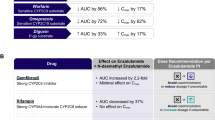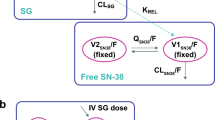Summary
Purpose To assess the maximum well-tolerated dose (MWTD), dose limiting toxicity (DLT), pharmacokinetics (PK) and pharmacodynamics of zibotentan, a novel specific endothelin-A receptor antagonist, in patients with metastatic prostate cancer. Methods Patients with metastatic, castrate-resistant prostate cancer (CRPC) were treated with escalating doses of oral zibotentan (ZD4054) 10–200 mg once daily. The initial cohort received 28 daily doses (Period 1). Patients who had evidence of clinical benefit and who had not met any of the criteria for withdrawal were allowed to receive zibotentan at their current dose level until they no longer derived clinical benefit (Period 2). PK of zibotentan and changes in prostate-specific antigen and bone markers were also assessed. Results Sixteen patients were evaluable for the safety and single-dose PK analyses. Eleven patients completed Period 1, and nine patients proceeded to Period 2. DLTs were encountered at 22.5 mg; one patient had grade 3 dyspnea and peripheral edema and a second patient had grade 3 headache and intraventricular hemorrhage. Enrollment was expanded at the 15 mg dose level to further determine the safety and tolerability of zibotentan. No DLTs were seen at 15 mg, and the most frequent adverse events were headache, peripheral edema, fatigue, nasal congestion and nausea. Conclusions The MWTD for zibotentan was 15 mg orally daily. The predominant adverse events observed were consistent with those reported for this class of drugs, and prolonged stable disease was noted in some patients. Phase III studies with zibotentan in men with metastatic CRPC are ongoing.

Similar content being viewed by others
References
Jemal A, Siegel R, Ward E, Hao Y, Xu J, Murray T, Thun MJ (2008) Cancer statistics, 2008. CA Cancer J Clin 58:71–96
Savarese DM, Halabi S, Hars V, Akerley WL, Taplin ME, Godley PA, Hussain A, Small EJ, Vogelzang NJ (2001) Phase II study of docetaxel, estramustine, and low-dose hydrocortisone in men with hormone-refractory prostate cancer: a final report of CALGB 9780. Cancer and Leukemia Group B. J Clin Oncol 19:2509–2516
Tannock IF, de Wit R, Berry WR, Horti J, Pluzanska A, Chi KN, Oudard S, Theodore C, James ND, Turesson I, Rosenthal MA, Eisenberger MA (2004) Docetaxel plus prednisone or mitoxantrone plus prednisone for advanced prostate cancer. N Engl J Med 351:1502–1512
Petrylak DP, Tangen CM, Hussain MH, Lara PN Jr, Jones JA, Taplin ME, Burch PA, Berry D, Moinpour C, Kohli M, Benson MC, Small EJ, Raghavan D, Crawford ED (2004) Docetaxel and estramustine compared with mitoxantrone and prednisone for advanced refractory prostate cancer. N Engl J Med 351:1513–1520
Berthold DR, Pond GR, de Wit R, Eisenberger M, Tannock IF (2008) Survival and PSA response of patients in the TAX 327 study who crossed over to receive docetaxel after mitoxantrone or vice versa. Ann Oncol 19:1749–1753
Nelson J, Bagnato A, Battistini B, Nisen P (2003) The endothelin axis: emerging role in cancer. Nat Rev Cancer 3:110–116
Levin ER (1995) Endothelins. N Engl J Med 333:356–363
Goldie RG (1999) Endothelins in health and disease: an overview. Clin Exp Pharmacol Physiol 26:145–148
Rubanyi GM, Polokoff MA (1994) Endothelins: molecular biology, biochemistry, pharmacology, physiology, and pathophysiology. Pharmacol Rev 46:325–415
Bagnato A, Catt KJ (1998) Endothelins as autocrine regulators of tumor cell growth. Trends Endocrinol Metab 9:378–383
Casey ML, Byrd W, MacDonald PC (1992) Massive amounts of immunoreactive endothelin in human seminal fluid. J Clin Endocrinol Metab 74:223–225
Nelson JB, Chan-Tack K, Hedican SP, Magnuson SR, Opgenorth TJ, Bova GS, Simons JW (1996) Endothelin-1 production and decreased endothelin B receptor expression in advanced prostate cancer. Cancer Res 56:663–668
Kobayashi S, Tang R, Wang B, Opgenorth T, Stein E, Shapiro E, Lepor H (1994) Localization of endothelin receptors in the human prostate. J Urol 151:763–766
Kobayashi S, Tang R, Wang B, Opgenorth T, Langenstroer P, Shapiro E, Lepor H (1994) Binding and functional properties of endothelin receptor subtypes in the human prostate. Mol Pharmacol 45:306–311
Nelson JB, Hedican SP, George DJ, Reddi AH, Piantadosi S, Eisenberger MA, Simons JW (1995) Identification of endothelin-1 in the pathophysiology of metastatic adenocarcinoma of the prostate. Nat Med 1:944–949
Papandreou CN, Usmani B, Geng Y, Bogenrieder T, Freeman R, Wilk S, Finstad CL, Reuter VE, Powell CT, Scheinberg D, Magill C, Scher HI, Albino AP, Nanus DM (1998) Neutral endopeptidase 24.11 loss in metastatic human prostate cancer contributes to androgen-independent progression. Nat Med 4:50–57
Nelson JB, Nguyen SH, Wu-Wong JR, Opgenorth TJ, Dixon DB, Chung LW, Inoue N (1999) New bone formation in an osteoblastic tumor model is increased by endothelin-1 overexpression and decreased by endothelin A receptor blockade. Urology 53:1063–1069
Alam AS, Gallagher A, Shankar V, Ghatei MA, Datta HK, Huang CL, Moonga BS, Chambers TJ, Bloom SR, Zaidi M (1992) Endothelin inhibits osteoclastic bone resorption by a direct effect on cell motility: implications for the vascular control of bone resorption. Endocrinology 130:3617–3624
Carducci MA, Padley RJ, Breul J, Vogelzang NJ, Zonnenberg BA, Daliani DD, Schulman CC, Nabulsi AA, Humerickhouse RA, Weinberg MA, Schmitt JL, Nelson JB (2003) Effect of endothelin-A receptor blockade with atrasentan on tumor progression in men with hormone-refractory prostate cancer: a randomized, phase II, placebo-controlled trial. J Clin Oncol 21:679–689
Chiao JW, Moonga BS, Yang YM, Kancherla R, Mittelman A, Wu-Wong JR, Ahmed T (2000) Endothelin-1 from prostate cancer cells is enhanced by bone contact which blocks osteoclastic bone resorption. Br J Cancer 83:360–365
Carducci MA, Saad F, Abrahamsson PA, Dearnaley DP, Schulman CC, North SA, Sleep DJ, Isaacson JD, Nelson JB (2007) A phase 3 randomized controlled trial of the efficacy and safety of atrasentan in men with metastatic hormone-refractory prostate cancer. Cancer 110:1959–1966
Growcott JW (2009) Preclinical anticancer activity of the specific endothelin A receptor antagonist ZD4054. Anticancer Drugs 20:83–88
Morris CD, Rose A, Curwen J, Hughes AM, Wilson DJ, Webb DJ (2005) Specific inhibition of the endothelin A receptor with ZD4054: clinical and pre-clinical evidence. Br J Cancer 92:2148–2152
James ND, Caty A, Borre M, Zonnenberg BA, Beuzeboc P, Morris T, Phung D, Dawson NA (2009) Safety and efficacy of the specific endothelin A receptor antagonist ZD4054 in patients with hormone-resistant prostate cancer and bone metastases who were pain free or mildly symptomatic: a double-blind, placebo-controlled, randomized, Phase II trial. Eur Urol 55:1112–1123
Zonnenberg B, Borre M, Beuzeboc P, Payne H, Culine S, Morris T, Phung D, James N (2008) The effect of ZD4054 on bone metastasis in patients with M1 hormone-resistant prostate cancer. Calcif Tissue Int 82(Suppl 1):S95 abst P093
Bagnato A, Tecce R, Moretti C, Di Castro V, Spergel D, Catt KJ (1995) Autocrine actions of endothelin-1 as a growth factor in human ovarian carcinoma cells. Clin Cancer Res 1:1059–1066
Bagnato A, Cirilli A, Salani D, Simeone P, Muller A, Nicotra MR, Natali PG, Venuti A (2002) Growth inhibition of cervix carcinoma cells in vivo by endothelin A receptor blockade. Cancer Res 62:6381–6384
Drimal J, Drimal J Jr, Drimal D (2000) Enhanced endothelin ET(B) receptor down-regulation in human tumor cells. Eur J Pharmacol 396:19–22
Grimshaw MJ, Naylor S, Balkwill FR (2002) Endothelin-2 is a hypoxia-induced autocrine survival factor for breast tumor cells. Mol Cancer Ther 1:1273–1281
Lahav R, Heffner G, Patterson PH (1999) An endothelin receptor B antagonist inhibits growth and induces cell death in human melanoma cells in vitro and in vivo. Proc Natl Acad Sci U S A 96:11496–11500
Pflug BR, Zheng H, Udan MS, D’Antonio JM, Marshall FF, Brooks JD, Nelson JB (2007) Endothelin-1 promotes cell survival in renal cell carcinoma through the ET(A) receptor. Cancer Lett 246:139–148
Acknowledgments
We would like to thank the members of the GU Oncology Research Groups at the University of Wisconsin Paul P. Carbone Comprehensive Cancer Center and the Taussig Cancer Institute for their efforts on this study.
Conflict of Interest
R. Dreicer has received research support from Astra Zeneca, and T. Morris and D. Phung are employed by AstraZeneca. There are no other conflicts of interest.
Author information
Authors and Affiliations
Corresponding author
Rights and permissions
About this article
Cite this article
Schelman, W.R., Liu, G., Wilding, G. et al. A phase I study of zibotentan (ZD4054) in patients with metastatic, castrate-resistant prostate cancer. Invest New Drugs 29, 118–125 (2011). https://doi.org/10.1007/s10637-009-9318-5
Received:
Accepted:
Published:
Issue Date:
DOI: https://doi.org/10.1007/s10637-009-9318-5




